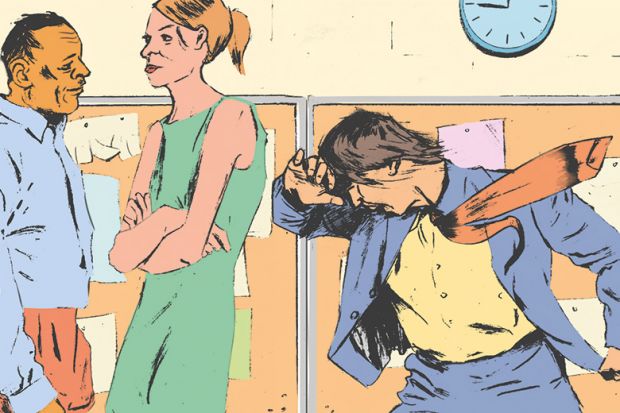Last September, as colleagues back in the Midwest applied the finishing touches to syllabuses they hoped would prove watertight, I bent my shoulder to the grim task of cleaning up after Category 1 Hurricane Hermine struck the Gulf Coast region of Florida, my family’s home-away-from-home for three generations.
At the time, the events seemed surreal: mandatory evacuation from many of the barrier islands of the Florida Panhandle, followed by a trip inland, then back to the hurricane-struck Gulf Coast in the few remaining days before the new academic year began. Under ordinary circumstances, I would have been occupied by mundane make-ready tasks. But now I was on my knees.
Expressing my losses and grief to others back on campus seemed circumstantially impractical and professionally injudicious. Time was ticking. And though the practical exigencies of restoring running water and electricity occupied my mind, a separate, second track ran along beneath, bubbling up in the rare moments when the wrench rested.
It wasn’t just tragedy I was experiencing, but cognitive disequilibrium. Weren’t professors like me supposed to have all the answers? Weren’t we professionally inclined to be the comforter rather than the comfortee? Weren’t we imagined to be solidly middle class, with well-insured homes in leafy suburbs unaffected by such massive natural calamities? And yet here I was, uninsured and in over my head, singularly unprepared for the depth and rigour of the challenge before me.
Higher learning, we’re told, requires centredness, concentration and undivided attention. Yet, as I grappled with the aftermath of the first hurricane to strike Florida in a decade, I realised that, in the moment, I possessed none of these traits. Praised my whole life for deep powers of concentration, suddenly I was ADHD personified. Knee-deep in a personal as well as regional tragedy, I couldn’t think about lesson plans, or learning objectives, or grading rubrics, much as I tried. And I felt guilt and shame for it.
I understood, better than at any time before, that for those suffering from tragedy, returning to the utopian dreaminess of college only heightens the feelings of distance and alienation. Every seasoned teacher worth their salt learns to read signs of deep hurt in the eyes of students. Often that hurt is intensely hermetic – a grandparent or a parent lost, a divorce or downsizing, a disorienting relocation or unwanted estrangement. The student may be in class, soldiering on, but their mind and heart are far away, at the locus of their particular pain. Try as they might, they cannot remember deadlines or complete groupwork; the loss they feel makes the lofty aims of higher education feel irrelevant or silly, especially when class is over and they are left to face their grief in a separate silence.
As I reached out, haltingly, to a few trusted colleagues on campus, I found myself disappointed at the response to a little-covered human tragedy happening a thousand miles away. I felt anew what suffering students so often feel – the compassion fatigue emanating from weary professors and administrators for whom such losses can come to feel like a cliché – like the scores of grandmothers who, according to the overworked and overtired cynics in faculty lounges, somehow obligingly pass away during final exam week. Now I was on the other end, debating who, if anyone, would understand the pain of a storm that broke my heart and busted my nest egg.
Much training goes into recognising the signs of trauma and tragedy among students; we think nothing of extending an essay deadline for a victim of a natural disaster. But precious little training goes into recognising and successfully empathising with colleagues. We, the very educators who speak at great length about the retention, health and wellness of students, find ourselves to be distant at best when the sufferer is a colleague that we need to do a million things for us, and for our academic programme.
In the end, I returned to campus in time for the new semester, donning the cape and wearing the mask. But, inside, I was hurting, and profoundly disenchanted by academe’s ability to live up to its own beliefs: compassion, tolerance, awareness of others’ suffering in the face of tragedy.
This year’s more deadly hurricanes, Harvey, Irma and Maria, offer colleges and universities a chance not just to offer their hearts to displaced, disrupted and disheartened student victims, but also to faculty, staff and administrators touched by tragedy. They remind all of us in higher education of the need to prove our cosmopolitan virtues, educating our hearts and minds to the needs of natural disaster victims even when those catastrophic events befall people and places thousands of miles away, in topographies very unlike the sturdy bricks and mortar of our ivy-covered campuses.
Martin Luther King's statement that “injustice anywhere is a threat to justice everywhere” has become creed in progressive higher education. It should be equally self-evident that tragedy anywhere is tragedy everywhere that compassionate people live, work, study and strive.
Zachary Michael Jack is associate professor of English at North Central College in Naperville, Illinois.
POSTSCRIPT:
Print headline: Alone after the storm
Register to continue
Why register?
- Registration is free and only takes a moment
- Once registered, you can read 3 articles a month
- Sign up for our newsletter
Subscribe
Or subscribe for unlimited access to:
- Unlimited access to news, views, insights & reviews
- Digital editions
- Digital access to THE’s university and college rankings analysis
Already registered or a current subscriber? Login






